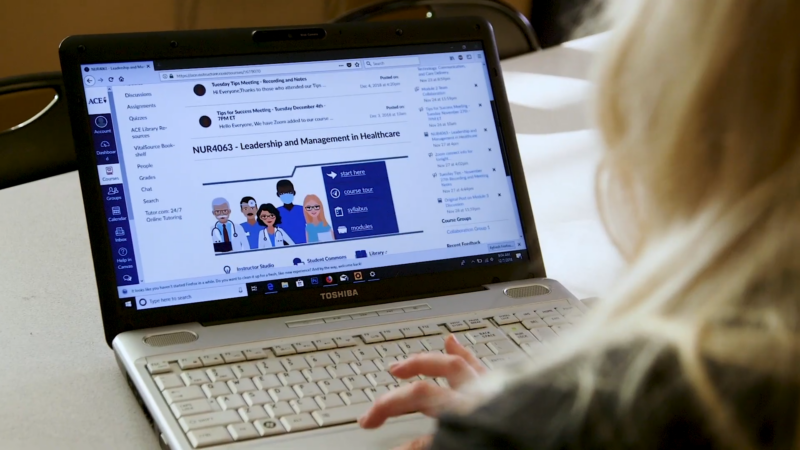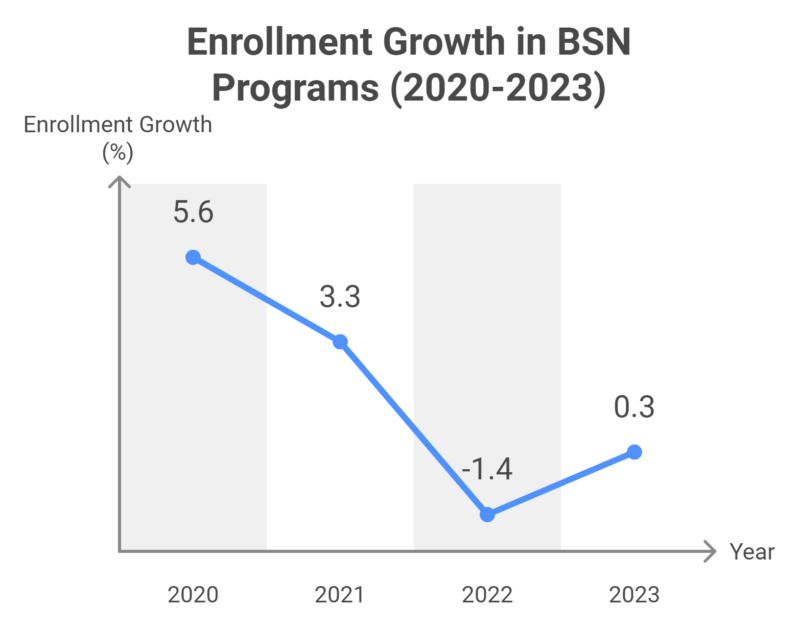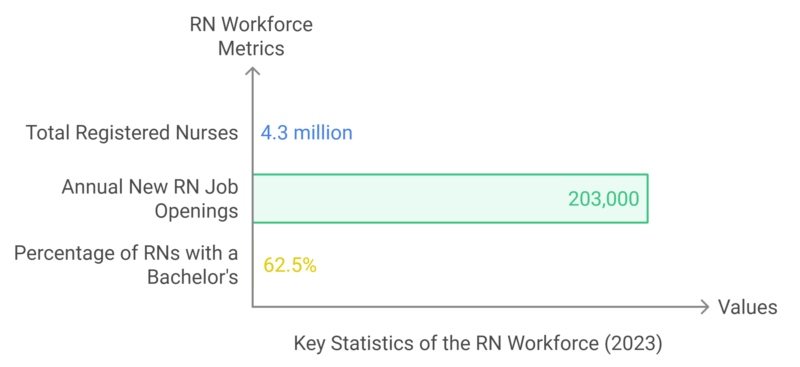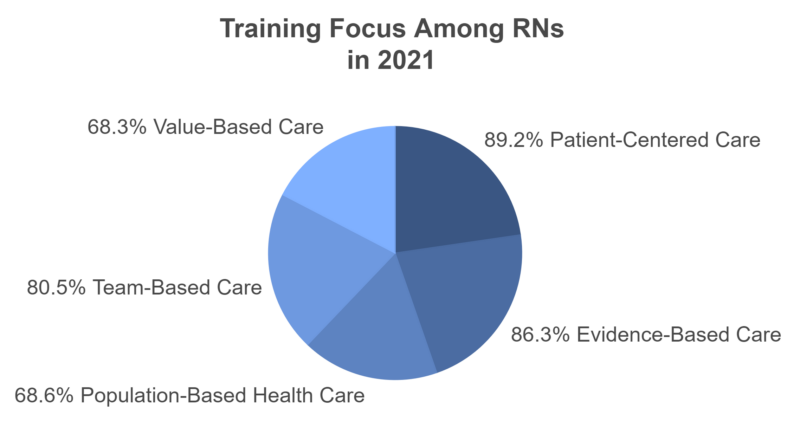The demand for healthcare professionals, particularly nurses, has grown significantly in recent years, largely driven by aging populations and increasing healthcare needs.
To meet this demand, there has been a noticeable shift toward online nursing programs, offering a flexible and accessible way to educate future nurses.
These programs have been praised for their ability to address both the growing nursing shortage and the need for more advanced degrees in the profession.
This raises an important question: are online nursing programs the future of nursing education?
That question begs an answer, right?
Table of Contents
ToggleThe Growth of Online Nursing Programs

Over the past decade, online nursing programs have seen remarkable expansion, particularly in response to the growing demand for further education among registered nurses (RNs).
These programs offer a flexible pathway for RNs to earn a Bachelor of Science in Nursing (BSN.) If you’re unsure where you can enroll, be sure to visit online.arbor.edu.
Key Role of RN-to-BSN Programs
- Flexibility for Working Nurses: Many nursing professionals find online programs attractive due to the ability to continue working while pursuing advanced degrees. Programs such as the RN-to-BSN pathway have played a crucial role in enabling registered nurses to advance their careers, with enrollment peaking at 139,587 students in 2018 as noted by AACN. However, recent years have seen a decline, with RN-to-BSN enrollments dropping by 9.9% in 2023 according to the reports
- Technological Integration: Online nursing programs now include sophisticated tools such as virtual simulations and telehealth training, helping students gain practical experience without being on-site. Virtual simulations are particularly valuable for learning critical skills like emergency response management
- Addressing the Nursing Shortage: As of 2023, nursing shortages remain a critical concern, with projected gaps in the workforce expected to continue through 2030. Online nursing programs help meet this demand by offering flexible entry points into the profession, including accelerated BSN programs designed for individuals from non-nursing backgrounds as per the report of AACN shows
Growth in Enrollment
- Many institutions have reported a consistent rise in enrollment, with some showing an annual growth of around 20%.
- This growth is driven by the flexibility these programs offer, allowing working professionals to balance their education with their careers and personal responsibilities.
The demand for nurses with advanced degrees continues to grow, positioning online nursing programs as a vital solution for both healthcare facilities and professionals seeking to meet these evolving needs.
Enrollment Trends in BSN Programs

During the COVID-19 pandemic, there was a significant rise in enrollment, with 5.6% growth in 2020, reflecting the increasing interest in healthcare careers. However, in 2022, there was a notable decline of 1.4%, the first drop in over two decades.
The slight recovery of 0.3% in 2023 signals a stabilization, though it highlights ongoing challenges in attracting new nursing students
Key factors contributing to this growth include:
Flexibility for Working Professionals

Online programs allow nurses to balance their professional and personal responsibilities while pursuing advanced education. This flexibility makes these programs highly attractive to those with demanding work schedules and family commitments.
Demand for Advanced Degrees
Healthcare institutions are prioritizing the hiring of nurses with advanced degrees, recognizing the need for highly skilled professionals. The demand for nurses with BSN, DNP or higher degrees has surged.
Online nursing programs are incorporating cutting-edge technology to create interactive and practical learning environments. These advancements enhance the learning experience through:
Technological Integration
The use of virtual simulations, interactive modules, and other digital tools offers students practical skills alongside theoretical knowledge.
These tools mirror real-world clinical situations, helping nurses develop critical thinking and problem-solving abilities.
The need for highly educated nurses becomes more apparent.
Online education continues to evolve to meet these demands, providing an efficient and scalable solution for advancing nursing education.
Advantages of Online Nursing Education

Online nursing education offers a range of benefits that cater to the diverse needs of students, particularly those already working in the healthcare field.
These advantages make online programs a flexible and accessible alternative to traditional nursing education.
Flexibility and Work-Life Balance
One of the most significant advantages of online nursing education is its flexibility. Students can design their own learning schedules, which is especially beneficial for those juggling multiple responsibilities such as full-time employment, family obligations, or personal commitments.
Online programs often allow students to progress at their own pace. This is critical for those who need more time to absorb complex medical concepts or balance challenging workloads. Self-paced learning accommodates various learning styles and ensures that students can focus on areas where they need more attention.
Accessibility for Diverse Populations

For students living in remote or underserved areas, online nursing programs eliminate the need to relocate or commute long distances. They can access high-quality education from institutions that may not have been available to them otherwise.
Online programs often come with lower tuition costs compared to on-campus counterparts. Additionally, students save on commuting, housing, and other expenses associated with attending a physical campus.
Financial aid and scholarships are often available for online students, making higher education more accessible to those with limited financial means.
Advanced Technological Integration
Now let us talk about examples of advanced technological integration.
Virtual Simulations
Online nursing education has greatly benefited from technological advancements. Virtual simulations allow students to practice clinical skills in a risk-free environment.
Example: A student can practice emergency responses, such as managing a cardiac arrest or administering medication, using a virtual patient simulator before facing similar situations in real life.
Interactive Learning Modules
Courses are designed with interactive elements, such as quizzes, videos, and case studies, to engage students and reinforce learning. Interactive modules help break down complex subjects, making them easier to understand and retain.
Alignment with Modern Healthcare Trends
Learning Telehealth Platforms Shows Benefit for Pharmacy Students https://t.co/V4DI1x1LIP #CIHC_ca
— CIHC (@CIHC_ca) May 16, 2024
Telehealth Integration: Online nursing education is aligned with current trends in healthcare, such as telehealth and smart hospitals.
As healthcare increasingly adopts technology for patient care, nurses educated in these systems are better prepared to integrate technology into their practice.
Online programs frequently include telehealth training, preparing students for the growing role of remote patient monitoring and virtual consultations.
Challenges Facing Online Nursing Education

Despite the numerous benefits, online nursing education faces significant challenges, particularly in terms of faculty shortages and the need for hands-on clinical experience. The shortage of qualified nursing educators has become a pressing issue.
With many experienced nurses opting for clinical roles that offer higher salaries, nursing programs struggle to find enough faculty to meet growing student enrollment.
The shortage contributes to program caps, limiting the number of students who can be admitted each year.
Another significant challenge is the provision of hands-on clinical experience, which is critical to nursing education.
While online programs have made strides with virtual and augmented reality simulations, replicating the complexity and variability of real-life clinical situations remains difficult.
Innovative solutions like virtual clinical training environments are emerging, but there is still a gap between these digital tools and the actual in-person experience needed to fully prepare nursing students for the workforce.
Despite these challenges, online nursing programs continue to seek innovative ways to ensure that students receive the practical training necessary to succeed in the field.
General RN Workforce Statistics

The nursing profession remains the largest healthcare occupation in the U.S., with a workforce of 4.3 million RNs. As the demand for healthcare services increases, over 203,000 new RN positions are expected to open annually until 2031.
Additionally, 62.5% of RNs currently hold at least a bachelor’s degree, reinforcing the importance of programs like RN-to-BSN and online BSN degrees to meet the growing qualification demands in the profession according to the Bureau of Health Workforce
The Impact of Online Nursing Programs on Career Advancement

Online nursing programs have significantly enhanced career advancement opportunities for nurses. Key points include:
- Nurses who pursue advanced degrees such as BSN or MSN have a greater chance of moving into leadership positions.
- Online programs also enable nurses to specialize in areas like pediatrics, oncology, or critical care, opening doors to more focused and higher-paying roles within the healthcare system.
- There is a strong link between nurses with advanced degrees and improved patient outcomes. Studies show that better-educated nurses contribute to reduced patient mortality rates and higher levels of patient satisfaction.
Another vital benefit of online nursing programs is their role in supporting lifelong learning:
- The healthcare field is rapidly evolving, with new technologies, treatments, and best practices emerging frequently.
- By offering opportunities for further certifications and professional development, online programs ensure that nurses can remain competitive and relevant in their careers, even as healthcare standards evolve.
In essence, online nursing education serves as a powerful tool for both immediate career advancement and long-term professional growth.
Training Focus Among RNs

Bureau of Health Workforce notes that the emphasis on continuous education and specialized training remains critical in the nursing field. Nearly 90% of the RN workforce has received training in patient-centered care, and over 68% are trained in value-based and population-based care, reflecting modern healthcare trends that prioritize quality outcomes and community-focused care.
These training figures indicate a growing need for advanced and continuing education programs, including online platforms, to keep up with these training demands
Methodology
Data was gathered from multiple reputable sources including reports from the American Association of Colleges of Nursing (AACN) and Bureau of Health Workforce, as well as industry insights from Nurse.org.
Key data points such as enrollment trends, workforce statistics, and technological advancements were extracted from national surveys and industry publications. This approach ensured a comprehensive analysis of current trends in online nursing education, its benefits, and the challenges the field faces.
Summary
Online nursing programs have the potential to transform nursing education by offering flexible, accessible, and innovative solutions to current challenges.
While there are obstacles to overcome, particularly in hands-on training and faculty shortages, the benefits of online learning are undeniable.
Online nursing education is likely to play an increasingly vital role in shaping the future of the profession.
References
- Aacnnursing.org – New Data Show Enrollment Declines in Schools of Nursing, Raising Concerns About the Nation’s Nursing Workforce
- Aacnnursing.org – Nursing Schools See Enrollment Increases in Entry-Level Programs, Signaling Strong Interest in Nursing Careers
- Aacnnursing.org – New AACN Data Points to Enrollment Challenges Facing U.S. Schools of Nursing
- Aacnnursing.org – Student Enrollment Surged in U.S. Schools of Nursing in 2020 Despite Challenges Presented by the Pandemic
- US News – Financial Aid for Online Programs: What to Expect
- Sim JJM, Rusli KDB, Seah B, Levett-Jones T, Lau Y, Liaw SY. Virtual Simulation to Enhance Clinical Reasoning in Nursing: A Systematic Review and Meta-analysis. Clin Simul Nurs. 2022 Aug;69:26-39. doi: 10.1016/j.ecns.2022.05.006. Epub 2022 Jun 15. PMID: 35754937; PMCID: PMC9212904.
- BHW.gov – Nursing Education and Training: Data from the 2022 NSSRN
- Nurse.org – Nursing School Enrollment Low, Despite Skyrocketing Interest








